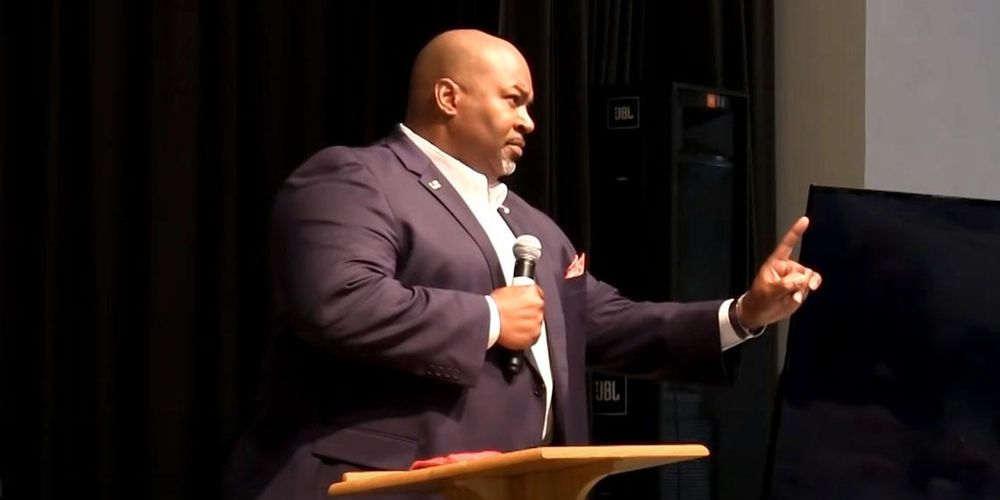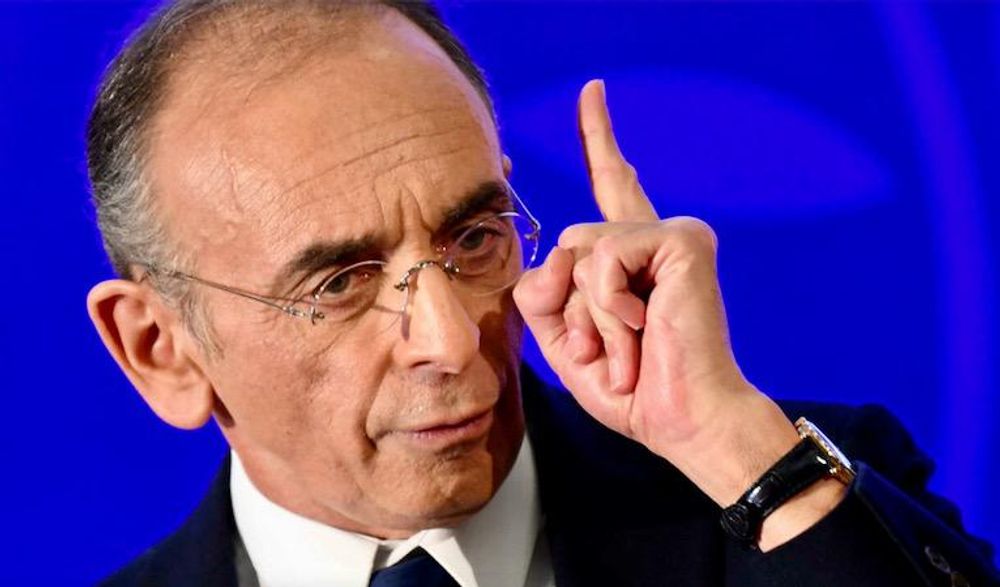John Stoehr
March 23, 2022

US President Donald Trump and Russia's President Vladimir Putin shake hands during a meeting on the sidelines of the G20 Summit in Hamburg, Germany, on July 7, 2017 (AFP).
The former president keeps telling on himself. During an appearance Sunday on Jeanine Pirro’s radio show on WABC, Donald Trump expressed, yet again, his sympathy for Russia’s reigning kleptocrat.
"He's got a big ego," Trump said of Vladimir Putin. “I think what's going on now is hard. I understand he's gotten rid of a lot of his generals."
They wanted to rebuild the Soviet Union. That’s what this is all about to a large extent. And then you say, what’s the purpose of this? They had a country. You could see it was a country where there was a lot of love and we’re doing it because, you know, somebody wants to make his country larger or he wants to put it back the way it was.
Sympathy, yes, but there’s more.
Sympathy is practical.
Whenever Trump is asked to comment on Putin’s 2014 capture of the Crimean peninsula or his invasion of Ukraine now, he gives these odd statements – odd because they never feature principles of freedom, sovereignty, or any other aspect of the postwar international order.
His attention is drawn, instead, to strength and weakness, power and powerlessness. In that binary worldview, Putin (and by proxy Trump) is always strong, Putin’s enemies (and by proxy Trump’s enemies) are always weak. Good and bad, right and wrong, mean nothing. What matters is what can be done immediately to satiate the insatiable need.
Fascism is practical like that.
As Nathan Crick, author of Dewey and the New Age of Fascism, told me: The Nazis saw practical as “immediately practical and [it] served the most basic needs of life in a tangible and objective way. I need money, I need a home, I need cheap oil prices, I need coffee, I need a family, I need land. Fascism is practical because it basically steals all of this and redistributes it to the chosen people as if they made it themselves.
“It’s basic gangsterism, which is certainly practical.”
Bear this in mind as I tell you something I hope will make all of this make more sense. When I say “all of this,” I mean everything:
Putin’s theft of the Crimean peninsula; Trump’s business interests in Moscow; his run for president; the Kremlin’s cyberwar against Hillary Clinton; Trump’s extortion of Ukraine’s Volodymyr Zelenskyy; his first impeachment; the J6 insurrection; Trump’s second impeachment; and now the invasion of Ukraine and Trump sympathy for the invaders.
Instead of thinking about Trump as a real estate magnate, a reality-TV star, or a former president, it’s perhaps more accurate to think of him as a caporegime, or mafia captain. Putin is The Boss. That would suggest Trump, like Roman Abramovich, is one of Putin’s “oligarchs.”
Oligarchs are practical. After they steal money, they hide it.
In America.
The US financial system is one of the most secretive and least transparent in the world. Dirty money is often disguised in real estate deals. The problem is so bad in places like Manhattan that lawmakers are pushing for reform. Brad Hoylman, a New York state senator repping Manhattan, said Sunday of proposed transparency laws that:
“These oligarchs who have stolen money from the Russian people are propping up Putin in the meantime. That money needs to be exposed and returned rather than wage a war against the Ukrainian people.”
Dirty money is also funneled through shell companies linked to super PACs linked directly or indirectly to candidates for public office for the purpose of influencing electoral outcomes in the Kremlin’s favor. Such candidates, it’s widely believed true, including the former president.
“Russian money is unquestionably flowing into the US for political influence,” Anna Massoglia, the editorial and investigations manager at Open Secrets, a nonprofit based in Washington, DC, told me. “There have also been instances in which Russian money flowed into US elections through shell companies as a part of illegal conduit schemes.” (The interview below is with Anna. She knows everything about this.)
Buying influence.
Buying a president.
“It’s basic gangsterism,” Nathan said. Which is practical.
Do we know concretely that Russian money is flowing into campaigns for public office in the US?
Russian money is unquestionably flowing into the US for political influence but the question of whether Russian money is flowing into campaigns for public office is more complex. Foreign nationals are barred from giving money to influence outcomes in US elections.
We have tracked political contributions from foreign agents who were hired to represent Russian interests in the US as well as contributions from associates of foreign oligarchs, which is generally permissible so long as they are not acting as proxies for Russian foreign nationals.
There have also been instances in which Russian money flowed into US elections through shell companies as a part of illegal conduit schemes.
So there is a circuitous paper trail from Russia to Washington. Along the way, the origins of the money are increasingly obscured?
Absolutely.
Russian foreign nationals seeking to influence US elections have a wide range of options through which they can funnel foreign money in support of candidates for public office – with little or no detection.
The 2020 election alone attracted more than $1 billion from shell companies and nonprofits that do not disclose their donors.
It would be nearly impossible to total up how much so-called “dark money,” routed through nonprofits that don't disclose their donors or shell companies, comes from Russian sources. Dark money lacks disclosure, making the source of funds untraceable.
This means foreign nationals are not only able to quietly steer money into swaying the outcome of US elections but they can potentially buy access to public officials, helping them push agendas in the states.
What's the Republican-Democrat ratio?
We can tell how much money from undisclosed sources goes to groups spending to support Democrats versus Republicans.
Traditionally, dark money benefitted Republican candidates more but the tables turned during the 2018 election cycle. Since then, we have seen dark money benefit groups backing Democrats more than Republicans but it still flows into groups on both sides of the aisle. It is still early in the election cycle so we are likely to see more money continue to pour in that may benefit one side over the other, though.
It's legal for lobbyists representing foreign clients, even Russian ones, to give donations so long as they aren't giving on behalf of that client.
But political contributions are a way for donors to curry influence. Giving significant sums of money could give a lobbyist representing a foreign client an advantage when they meet with elected officials.
Most lobbying firms have ended work with Russian clients at this point. As of today, the only entities still registered to actively represent Russian interests under the Foreign Agents Registration Act are LLCs that have been paid as part of Russia's propaganda campaigns.
Maffick LLC, a social media digital content company (that was labeled a “Russian state-backed entity” by Facebook, Twitter, and YouTube), registered as a foreign agent of Russia’s state-owned media agency in December. It has since terminated their contract, however.
The remaining entities registered as foreign agents of propaganda outlets connected to Russia are Reston Translator LLC, RM Broadcasting LLC, Ghebi LLC, and T&R Productions LLC but that may change if new restrictions are put in place since RT America shut down.
House Minority Leader Kevin McCarthy once said, “I think Putin pays Trump.” Given what you know, how likely is that to be true?
There are multiple reported instances where Russian money has allegedly flowed into groups spending in support of Trump.
Lev Parnas – the former business associate of the former president’s personal attorney Rudy Giuliani – was convicted on charges related to steering $325,000 from a Russian national through a shell company to a super PAC supporting Trump. Parnas' former business partner, Igor Fruman, pleaded guilty to soliciting money from a foreign national.
There are other examples as well.
Two Republican operatives were indicted last September on charges of allegedly funneling money from a Russian national to the Trump campaign’s joint fundraising committee.
This example is not as clear-cut but the NRA's ties to Russia were probed. The gun-rights group ultimately admitted to taking Russian money but claimed the money wasn’t used for political purposes.
This is particularly noteworthy since a report from Senate Finance Committee Democrats found that the NRA acted as a “foreign asset” for Russia in the leadup to Trump’s 2016 election. For context, the NRA spent more than $31 million boosting Trump in the 2016 election.
Any evidence of recipients knowing they’re getting Russian money?
I am not aware of any recent cases where we know the politicians were aware they were getting Russian money but we only know what has been disclosed, not what is happening behind the scenes.
A politician facing allegations of knowingly taking foreign contributions is US Rep. Jeff Fortenberry, a Republican from Nebraska. He’s accused of meeting with a Lebanese-Nigerian billionaire who prosecutors say funneled money through straw donors to him.
Federal campaign finance has a “straw donor” ban that makes it illegal to give money under someone else’s name. One example would be if an individual takes money from a foreign national, then passes it along to politicians, causing the individual’s name to be reported in campaign finance filings instead of the foreign national’s name.
Funds may also be routed through shell companies in some cases, meaning the companies’ name is reported in campaign finance filings rather than the name of who is actually funding the contribution.
This could hide contributions from foreign nationals who are legally barred from giving money to influence US elections.
John Stoehr is a fellow at the Yale Journalism Initiative; a contributing writer for the Washington Monthly; a contributing editor for Religion Dispatches; and senior editor at Alternet. Follow him @johnastoehr.









